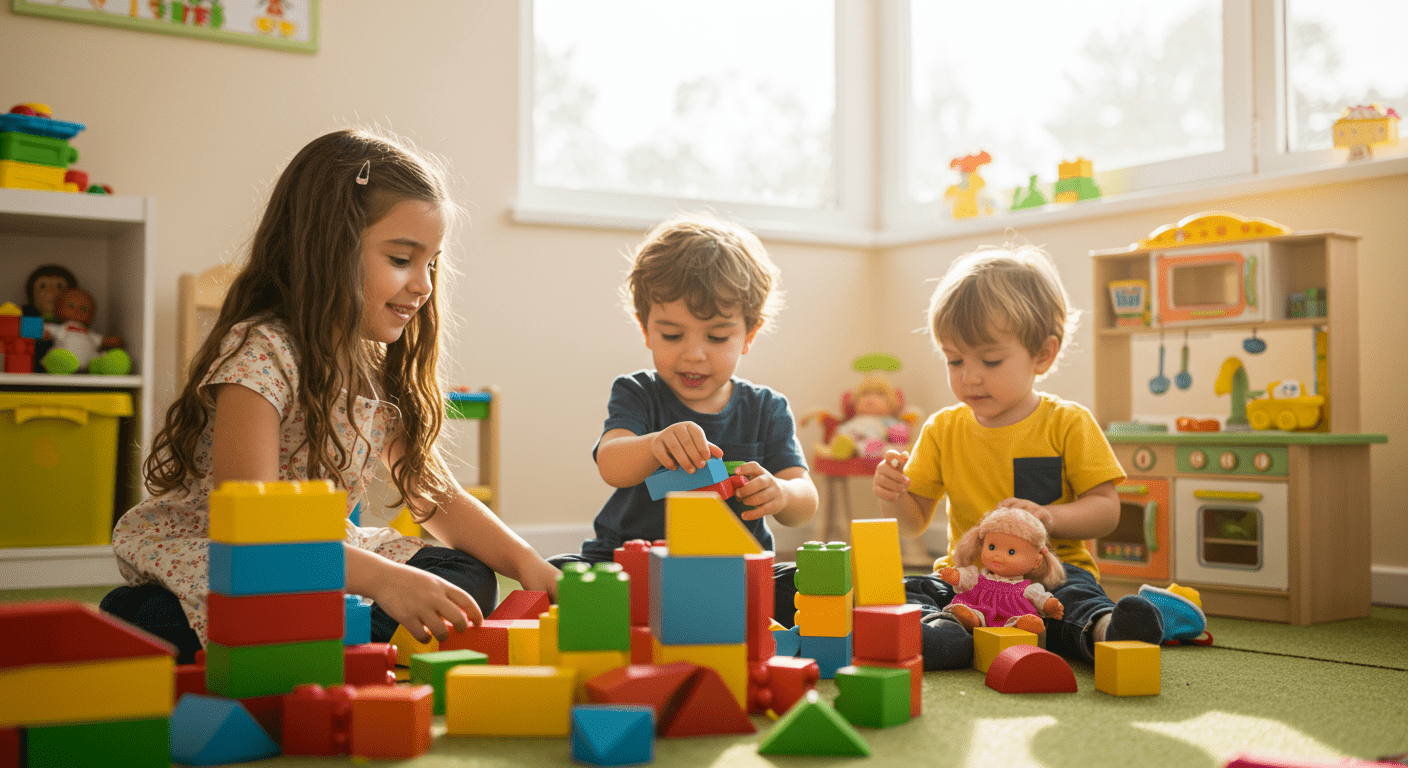
Benefits of Pretend Play Toys for Kids
Introduction
The benefits of pretend play toys for kids are vast and varied, making them a cornerstone of early childhood development. Through imaginative play, children explore different roles, engage in storytelling, and develop critical social and cognitive skills. These interactions are more than just fun and games; they offer educational value that fosters growth across multiple domains, ensuring children are equipped with essential skills for life.
Boosting Cognitive Growth and Creativity with Pretend Play Toys for Kids
Pretend play toys enhance cognitive development by fostering problem-solving and executive function as shown by recent studies.
Pretend play toys are instrumental in boosting cognitive development through pretend play, which involves planning, negotiation, and execution of complex ideas. Such activities enhance a child's executive function, a crucial component in problem-solving. Recent studies highlight how these interactions facilitate the development of cognitive abilities, providing opportunities for children to practice decision-making and strategic thinking naturally.
The educational value of pretend play cannot be understated, as it aligns closely with child development strategies that prioritize cognitive skills enhancement. Play scenarios encourage children to think ahead, consider consequences, and adapt to different roles and outcomes. This engaged learning process is essential for fostering cognitive skills that lay a foundation for future academic success.
Creative skills are significantly boosted when children engage in imaginative play, allowing them to explore varied scenarios and roles.
Imaginative play toys offer an incredible boost to creativity by allowing children to invent stories and dream up different worlds. The advantages of imaginative play for kids include the development of lateral thinking and creativity boost. This ability to take on different roles and scenarios nurtures creative thought processes and encourages inventive problem-solving.
The role of pretend play in child development is substantial. Creative exploration within play not only enhances creativity but also involves emotional expression, allowing children to explore feelings and emotions through characters and narratives. This dual development of creativity and emotional growth with pretend play toys sets a strong foundation for both personal and academic achievements.
Pretend play aligns with educational trends advocating for play-based learning models in early childhood education.
Educational trends are increasingly advocating for play-based learning models that incorporate pretend play. The role-playing toys benefits for children extend beyond just entertainment; they offer a significant educational advantage. These toys and trends promote a hands-on, engaging approach to learning that differs from traditional didactic methods, making learning enjoyable and deeply rooted in practical experiences.
By integrating educational toys supporting pretend play into early learning environments, educators harness the natural curiosity and energy of children, shifting focus from passive learning to active, learner-driven inquiry. The integration of such play-based methodologies aids in forming a holistically rounded education approach that nurtures all facets of child development.
Developing Social Skills and Emotional Growth Through Role-Playing Toys
Role-playing toys aid in social skill development, encouraging children to negotiate and communicate within play scenarios.
Role-playing toys substantially aid in pretend play and social skills development. Within these imaginative setups, children learn crucial communication and negotiation skills, seamlessly interacting with peers while taking on various roles. This kind of play naturally fosters conflict resolution and cooperation as children navigate the rules and dynamics of different scenarios.
These social benefits of imaginative play are essential for developing strong interpersonal skills. The ability to communicate effectively within these playful contexts supports the development of empathy and relationship-building capacities, which are vital skills in a connected, social world.
Emotional regulation is supported through pretend play as children learn to manage feelings in a safe, imaginative environment.
Emotional growth with pretend play toys is a critical component of early development. Within these imaginative scenarios, children can express, identify, and manage their emotions, learning to regulate feelings in a controlled, creative setting. This aspect of emotional education is invaluable, building resilience and self-awareness.
The supportive environment of pretend play lets children safely experiment with emotional responses and consequences, which bridges the gap between play and real-world social interactions. Through ongoing engagement in role-playing activities, children can strengthen their emotional literacy, a vital skill for handling the complexities of real life.
Research highlights the value of imaginative play in bridging social skill gaps often observed in screen-dependent lifestyles.
In contemporary times, with increasing screen time, the social skills of children may be adversely affected. However, the benefits of pretend play toys for kids can help counteract this by encouraging face-to-face interactions and social engagement. Research underscores the importance of imaginative play in re-establishing these foundational social skills, further supporting holistic development.
These interactions provide a counterbalance to the isolated nature of digital play, asking children to participate, collaborate, and communicate actively. Thus, imaginative play does more than entertain; it becomes a vital tool in ensuring well-rounded, socially adept children in an increasingly digital world.
Enhancing Language Skills and Learning Through Imaginative Play Toys
Imaginative play toys significantly contribute to language development as children practice new vocabulary in storytelling.
Imaginative play and language skills are deeply connected, as these toys provide rich contexts for practicing new vocabulary and linguistic constructs. Engaging in storytelling and dialogue within role-play settings offers diverse opportunities for language practice. Children learn by immersing themselves in different worlds, expanding their vocabulary and communication repertoire.
The educational benefits of role-playing toys are amplified through these interactions, providing a fertile ground for language learning. The practice gained through play fosters a natural and engaging learning process, which supports children's linguistic development seamlessly and effectively.
Educational benefits of role-playing toys are amplified as children engage in dialogues, boosting communication skills.
Role-playing scenarios, facilitated by imaginative play toys, are critical for boosting communication skills. Engaging in these dialogues often requires children to articulate thoughts clearly and listen actively to peers. This creates a dynamic environment where communication skills are refined naturally through practice and repetition.
Active participation in these dialogues not only enhances how pretend play aids cognitive skills but directly improves language competency. These activities encourage children to become adept communicators, a vital skill that serves them well across various developmental stages and future educational pursuits.
Studies show that children exposed to imaginative play demonstrate stronger language skills and creativity as part of early education.
Research consistently shows a robust link between exposure to imaginative play and improved language skills, emphasizing the need to incorporate such play into early education. Language development through pretend play toys is a proven outcome, with children benefitting from enriched vocabularies and enhanced creative expressions as they progress.
The learning benefits of role-playing toys extend further, supporting creativity and cognitive development through pretend play. By integrating these play structures into learning environments, educators can create more dynamic, inclusive, and effective learning experiences that empower children to build strong foundational skills.
How Imaginative Play Toys Support Problem-Solving and Cognitive Abilities in Children
Pretend play toys are crucial for enhancing problem-solving abilities by encouraging planning and execution of complex ideas.
The cognitive development through pretend play is amplified by the need for children to plan and execute ideas effectively. These toys are essential tools for enhancing problem-solving skills with play toys, as they require children to develop and test solutions actively. Through role-play, children engage with challenges that demand critical thinking and adaptive strategies.
By supporting these skills early, pretend play toys offer a foundation that enhances cognitive growth and strengthens intellectual capabilities. This play-driven exploration fosters an environment where learning and development occur organically, bridging the gap between play and practical, applicable wisdom.
Cognitive skills are actively developed as children engage in role-play and imaginative scenarios, fostering critical thinking.
Engaging in imaginative play toys encourages children to navigate complex scenarios, fostering critical thinking. This active engagement supports cognitive development and highlights the learning benefits of role-playing toys. Children develop cognitive flexibility as they adapt to changing storylines and outcomes.
The cognitive benefits are clear, with play promoting advanced problem-solving abilities, intellectual curiosity, and a love for learning. These roles invite children to think critically about actions and consequences, providing a holistic developmental experience that caters to both cognitive and social growth.
Latest educational trends emphasize the integration of unstructured play to balance academic instruction with cognitive skill development.
Today's educational trends strongly advocate for the integration of unstructured play in academic settings. The role of pretend play in child development is underscored by these trends, which highlight the benefits of embedding play within structured learning environments. This balance ensures that cognitive development through pretend play is maximized, alongside traditional academic instruction.
As educators and psychologists push for a more inclusive, engaging learning atmosphere, integrating pretend and imaginative play becomes a foundational education strategy. This dynamic approach helps address socio-emotional and intellectual developmental needs, promoting a balanced path toward lifelong learning and development.
Conclusion
Pretend play toys serve as a vital component in fostering cognitive, social, emotional, and language development in children. These toys provide a safe, imaginative space for skill-building, encouraging creativity while supporting educational goals through play-based learning. As educational trends continue to evolve, integrating these toys into early childhood development can bridge the gap between traditional and experiential learning, offering a holistic and engaging developmental experience for children.
Share
